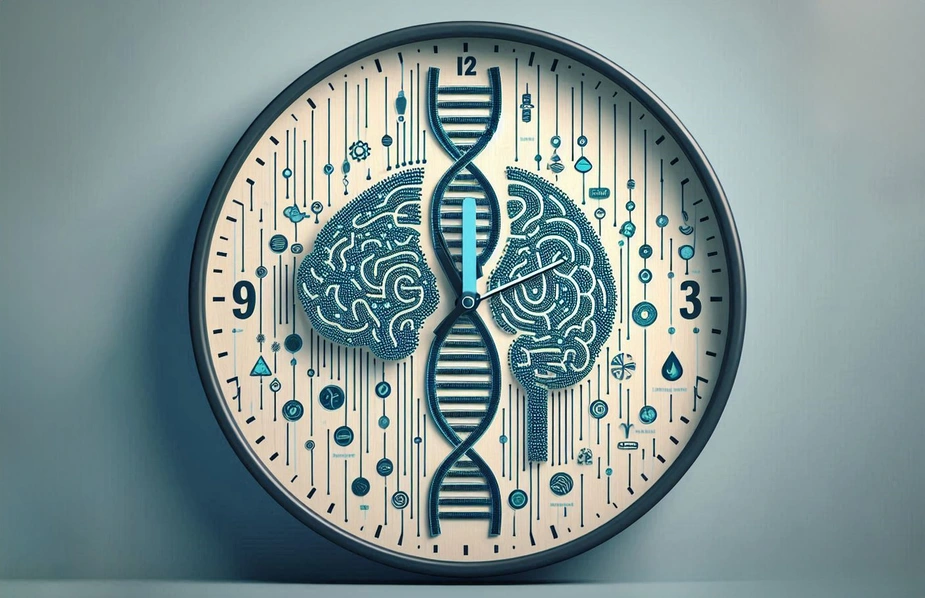New findings about the ageing brain
Researchers from HU uncover genetic causes and modifiable risks in a study involving more than 56,000 participants
Why do some brains age faster than others – and which factors play a role in this? Given the rise in life expectancy worldwide and the increase in age-related diseases such as dementia, answering this question is of great importance. However, brain ageing is a complex process whose genetic basis and biological mechanisms have not yet been characterised sufficiently.
To investigate this question, researchers at Humboldt University in Berlin, led by Dr Philippe Jawinski and Prof. Sebastian Markett, examined the genetic basis of the so-called brain age gap (BAG) – i. e. the difference between the biological age of the brain, which can be determined using MRI (magnetic resonance imaging) scans, and a person's actual age. The study was based on data from the UK Biobank, one of the largest research databases in the world. The results were recently published in the journal Nature Aging.
59 gene regions influence the pace of brain ageing - 39 regions are identified for the first time
For the study, the researchers evaluated genetic data and MRI scans from more than 56,000 participants. They identified 59 regions in the genome that influence the rate of brain ageing. These included 39 regions that were linked to brain ageing for the first time - and on top well-known genes such as MAPT and APOE, which are at the centre of Alzheimer's research. Certain variants of these genes are considered risk factors for the development of Alzheimer's disease.
What makes this study unique is not only the unprecedented number of participants, but also the depth of analysis. The researchers correlated the genetic findings with other, modifiable risk factors such as high blood pressure or smoking and alcohol consumption, as well as socio-economic factors such as income. ‘Our results show that the genetic basis of brain ageing is closely linked to health, behavioural and social factors,’ says study leader Dr Philippe Jawinski, postdoctoral researcher at the Department of Psychology at HU Berlin.
High blood pressure and type 2 diabetes are linked genetically to an increased risk of premature brain ageing
The analyses suggest that modifiable factors such as high blood pressure and type 2 diabetes – the acquired form of diabetes – are causally associated with accelerated brain ageing. This means that an increased risk of high blood pressure or type 2 diabetes is genetically linked to an increased risk of premature brain ageing. In addition, the researchers found genetic correlations with characteristics such as mental and physical health, socio-economic factors, and smoking or drinking habits. For example, they found links between emotional stability or low income and premature brain ageing. ‘Our analyses clearly show how valuable genetics is as a tool: it allows us not only to identify genetic factors, but also understand which modifiable factors play a role in brain ageing – at both the molecular and behavioural level,’ says Jawinski. ‘By controlling risk factors such as high blood pressure, we can actively contribute to healthy brain ageing – and thus promote our mental fitness into old age.’
Knowledge about risk factors can be put to use for prevention
The results are also promising for clinical practice, stresses Prof. Dr Sebastian Markett: ‘The the so-called brain age gap – i.e. the difference between the biological and actual age of the brain – allows us to determine the biological ageing of the brain. This will enable us to identify people who are at increased risk of dementia or other neurodegenerative diseases in the future – and take preventive action in a timely manner.’
The study was conducted in close collaboration with researchers from Charité – Universitätsmedizin Berlin, Leipzig University and the Max Planck Institute for Human Cognitive and Brain Sciences.
Publication:
Genome-wide analysis of brain age identifies 59 associated loci and unveils relationships with mental and physical health
Philippe Jawinski, Helena Forstbach, Holger Kirsten, Frauke Beyer, Arno Villringer, A. Veronica Witte, Markus Scholz, Stephan Ripke & Sebastian Markett
Nature Aging 5, 2086-2103 (2025). https://doi.org/10.1038/s43587-025-00962-7
Contact:
Humboldt-Universität zu Berlin
Department of Psychology
Dr. Philippe Jawinski
philippe.jawinski(at)hu-berlin.de
Prof. Dr. Sebastian Markett
sebastian.markett(at)hu-berlin.de
HU press release, 15. October 2025
